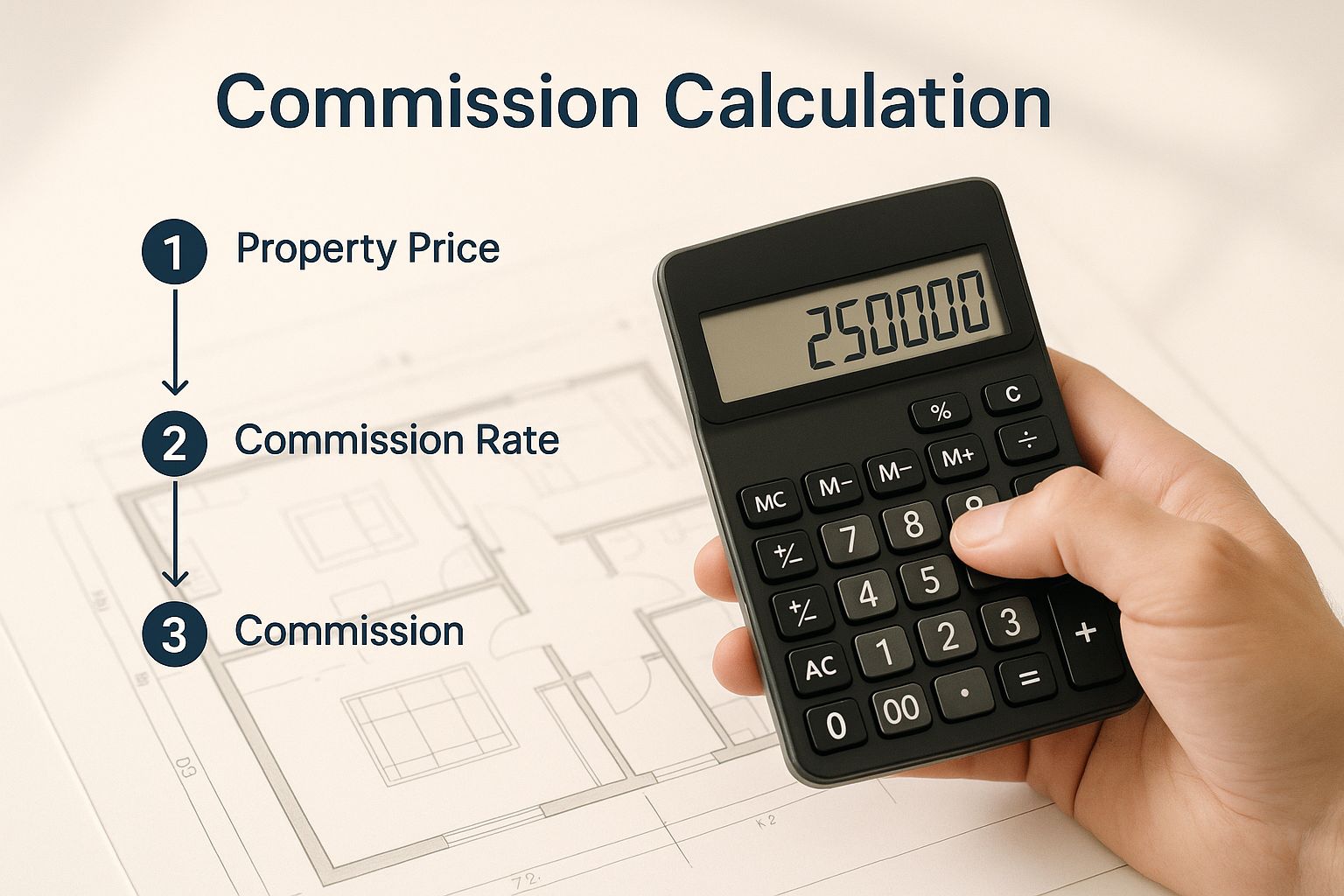A real estate commission represents the payment agents receive for their work in handling residential property sales. The seller must pay this fee which usually falls between 5% and 6% of the sale price from their closing proceeds and the commission gets divided between the seller’s agent and the buyer’s agent.
The guide explains commission structures and their typical price ranges and presents multiple strategies to handle this essential selling expenditure.
What Exactly Is Real Estate Commission?

The real estate commission functions as a performance-based compensation system. Agents cover all marketing expenses from professional photography to online listings before they receive payment which occurs only after your house sells.
The performance-based pay system functions as an effective motivational system. Through this process your agent will actively search for potential buyers who meet your criteria and work to get the most money possible for your property. Their paycheck depends on getting a successful result for your business.
How The Commission Is Calculated And Split
You need to establish the total commission rate with your listing agent before you sign any agreements. The full commission fee gets distributed between the two brokerages after the home sale closes because the seller’s brokerage receives fifty percent of the fee and the buyer’s brokerage receives the other fifty percent.
The split constitutes an essential element of the traditional real estate system. The system motivates all agents in the region to present your property to their qualified buyers which boosts your property’s exposure to a great extent.
The following example will show how these numbers function in actual practice.
Example Commission Split on a $400,000 Home Sale
The table demonstrates how a standard 6% commission on a $400,000 home sale gets distributed between the two real estate brokerages that participate in the deal.
| Component | Percentage | Dollar Amount |
|---|---|---|
| Sale Price of Home | 100% | $400,000 |
| Total Commission (e.g., 6%) | 6% | $24,000 |
| Seller’s Agent Share (3%) | 3% | $12,000 |
| Buyer’s Agent Share (3%) | 3% | $12,000 |
Each agent will distribute their $12,000 share to their respective brokerage organization.
Using a traditional agent stands as the single option but you can choose from other alternatives. Our guide about selling homes without realtors provides detailed information about various methods which many homeowners now use to sell their properties.
Direct home sales to cash buyers operate as a successful method because it enables fast transactions without any requirement to pay commissions or fees.
How the Commission Process Actually Works
Think of a real estate commission less as a simple fee and more like a project-based payment.Your agent will dedicate their time and expertise and their financial resources to market your property right away because they understand they will only receive payment when you close the deal.
The process starts when you sign your listing agreement. The formal handshake occurs during this stage because it establishes the official contract between you and your agent and their brokerage. The document also establishes the complete commission percentage. Your agent will start working on your case after you sign the agreement.
From Listing to Closing: What You’re Paying For
Your agent will start investing money to create profits for you once the agreement becomes active. The company covers all expenses for professional photography and listing your property on major online portals and yard sign placement and open house hosting. Your assistant acts as your main contact person while handling multiple tasks every single day.
- Coordinating Showings: They manage the constant back-and-forth of scheduling tours for interested buyers.
- Fielding Inquiries: Answering the never-ending stream of questions from buyers and their agents.
- The agent verifies buyer financial stability and evaluates offer terms before forwarding them to the seller.
- A skilled agent uses their expertise to obtain optimal prices and conditions for their clients.
The infographic presents a step-by-step explanation which shows how agent activities create home sale success.

The commission calculation exists as the final stage in this extensive customer service operation.
How the Payment is Handled
The transfer of funds occurs through which process? You don’t write a check directly to your agent.The total commission gets distributed during closing through a neutral third party who could be a title company or an attorney.
The agent will deduct their service fee from your home sale proceeds to give you the remaining amount of money.
Key Takeaway: The commission is paid out of the sale price, not on top of it.The final closing statement will resolve everything so you should not expect to receive any additional bills.
The title company will distribute the entire commission amount between the two brokerages by giving equal amounts to the seller’s agent’s brokerage and the buyer’s agent’s brokerage. From there, the brokerages pay their respective agents.
The conventional path exists as an option but you can explore other methods. The cash buying process from our company stands as an excellent solution for homeowners who want to avoid paying commissions when selling their property quickly. The process operates without any need for property listings or showings or extended negotiation periods.
So, What Are Commission Rates Actually Looking Like Today?
The first thing you need to think about when selling your home is how much it will cost you. What exactly should someone expect to pay for real estate agent fees? The first step to control expenses requires you to understand industry pricing so you can discuss costs with agents directly.
Think of the “average” commission as more of a ballpark figure than a hard rule.The rate remains open for negotiation because multiple elements determine its final value. These can include everything from the level of service an agent provides to how hot your local market is and even the price of your home.The pricing structure of agents varies because one agent provides complete services including professional photography and staging advice and marketing support while another offers only basic services.
What the Numbers Say
The current market price determines what sellers must pay. Industry statistics from recent times offer substantial information about this matter. A nationwide survey of agents found that the average total real estate commission in the U.S. is currently hovering around 5.44%.
Let’s put that into perspective.The home sale at the median price of $367,711 would result in total fees of $20,003 because of the 5.44% rate. The total amount gets divided into two parts which give 2.77% to the seller’s agent and 2.67% to the buyer’s agent. If you want to dig deeper into the data, you can read more about these commission findings and see the full breakdown.
The figures represent national averages. The actual going rate in your neighborhood might differ from the national average because of local market forces.
Why Commissions Aren’t Fixed
The common myth states that all real estate commissions must equal six percent.That’s just not how it works anymore.The rates that individual agents and their brokerages establish determine the actual costs which leads to various pricing structures.
Several things can influence the final number you land on:
- The market you operate in determines the flexibility of agent rates because it contains numerous agents who compete for the same listings.
- An agent would accept a lower commission rate for luxury properties because their final commission payment would be substantial.
- An experienced top-producing agent with exceptional marketing abilities would charge more than a new agent who recently obtained their license.
Key Insight: Negotiation is part of the game.You need to be bold when you talk about commission rates with agents during your interview process. A good agent will have no problem walking you through exactly what you’re getting for their fee.
Knowing these averages gives you power.The information helps you decide if an agent’s fee matches their service value and provides you with a starting point for your negotiation. The information about alternative routes which bypass commission fees remains essential to know.
How Commission Rates Vary By Location

Real estate commissions function without any established standard price range. The price of an agent’s services functions like milk and gas prices because rates differ widely between states and even within cities of the same state. The typical commission rate for any region becomes established through multiple local elements which work together to form the final value.
The biggest driver? The health of the local housing market.A seller’s market with rapid home sales enables agents to maintain their standard pricing structure. But in a slower buyer’s market, you’ll often see more competition among agents for fewer listings, which can sometimes give sellers a little more room to negotiate.
The Impact of Property Values
The median home price stands as the strongest factor which determines local interest rates. You might think that pricier markets would automatically mean higher commission percentages, but it’s often the other way around.
The agent sets their percentage rate lower for properties in high-value cities such as San Francisco. The total amount of money remains significant even though the percentage share is smaller. Compare that to an agent in a more affordable town in the Midwest.The agent needs to receive a higher commission rate for properties with lower prices to earn a suitable income for their work.
The system maintains equilibrium because it makes sure agents receive appropriate compensation for their skills and labor regardless of their regional market conditions.
Regional Commission Rate Trends
The data reveals distinct patterns which exist throughout different parts of the United States. The Southwest region which contains Texas and Arizona has an average real estate commission of 5.74% which exceeds the national average.
The Pacific region contains two expensive markets in California and Washington yet their average commission rate stands at 5.34%. You can discover more insights about regional commission rates to see where your area stacks up.
Key Takeaway: Typical commission rates stem from local market conditions because these rates do not follow any national standard. Your research about local market standards will help you determine reasonable price points for your property when you decide to sell.
The different market conditions across regions demonstrate how vital it is to understand your particular market area. Of course, if you’re looking to sidestep these variables entirely, you have options.Our guide on how to sell your home in Ohio without agent fees dives into some great alternatives.The most direct way to avoid commissions is by working with a cash buyer who will pay all fees so you don’t have to pay anything regardless of where you live.
Actionable Ways to Reduce Your Selling Costs
Real estate commission represents the largest payment most people will make when they sell their home. The good news?You have multiple effective methods to lower your expenses which will help you keep more of your hard-earned money.
Your best choice depends on how comfortable you feel with negotiating and how fast you need to sell and how much work you want to handle personally. The following section explains the best approaches.
Negotiate with a Traditional Agent
You need to keep in mind that commission rates do not have fixed values when you start searching for other options. Many sellers successfully bring that percentage down just by having a direct conversation.
An agent will probably reduce their fee when you sell a high-value property during a hot market and when you commit to using their services for your next home purchase. During your agent interviews you should ask about their fees and request them to explain their services at their current rates. A great agent will have a solid marketing plan and a proven track record to back it up, but they might still have wiggle room to earn your listing.
Consider Alternative Brokerage Models
The traditional full-service model isn’t the only game in town anymore.The following two options have become popular because they help you save on commission costs.
- Discount Brokerages: These firms offer many of the same core services you’d expect—MLS listings, marketing, and help with negotiations—but they do it for a lower percentage.The systems function through modern technology-based operations which deliver cost savings to customers.
- Flat-Fee MLS Services: This is a great choice if you’re comfortable handling most of the sale on your own.You pay a one-time flat fee to get your home listed on the local Multiple Listing Service (MLS), which is essential for visibility.After that, you’re in charge of showings, negotiations, and paperwork, but you completely avoid the listing agent’s commission.
Important Note: If you use a flat-fee service, you’ll almost certainly still need to offer a competitive commission to the buyer’s agent (usually 2.5% to 3%).Without it, agents have very little incentive to bring their clients to see your home.
Sell Directly to a Cash Buyer
The cash home buyer route stands as an excellent solution when you want to sell your home quickly with guaranteed payment and minimum complexity. This route cuts out real estate agents entirely, which means you pay zero real estate commission.
Eagle Quick For Cash operates as a business that buys homes directly from sellers by accepting the property in its present condition. This allows you to sidestep the entire traditional sales process—no listings, no showings, no staging, and no agonizing wait for a buyer’s mortgage to get approved.
The offer presented to you represents the total amount you will receive because these buyers typically handle all standard closing costs. The cash offer might not reach the highest possible market price but it often proves to be a smart financial choice because it eliminates commission fees and repair costs and holding costs. You can learn more by exploring the benefits of selling a house for cash and see if it’s the right fit for you.
The Bigger Picture on Commission Trends
Real estate commission analysis in the present day needs to consider the entire economic landscape. Average commission rates have steadily declined at a slow pace since the past twenty years.
The process does not lead agents to select lower wages for their work. The actual tale stems from a different economic transformation because housing costs keep rising without stopping. The rising property values have led to higher agent earnings per sale in dollar terms although their commission percentages have decreased slightly.
How Economic Shifts Influence Rates
A deep dive into U.S. residential real estate commissions from 1995 to 2023 really highlights this connection.The study shows that home prices determine commission rate changes more than any industry rule adjustments.
The commission rates drop slightly in areas where property prices tend to be higher. Since home values have been rising nationwide for years, this has pulled the national average down. If you want to get into the weeds, you can explore the full analysis on real estate broker compensation.
Key Insight: Think about it—a smaller percentage of a very expensive home can still be a huge payday for an agent.The reason behind this phenomenon is that rates tend to adjust according to local property values.
The discussion about commissions remains active because of this reason. Big industry shake-ups, like the recent NAR settlement, are already pushing for more transparency and new ways for agents to get paid.The modern market provides sellers with complete market knowledge and benefits that surpass any previous era.
To expand your financial knowledge you need to study various fee models which operate within real estate. You can gain better understanding by examining the property management fee structure guide. Learning about home seller warranties helps you protect your finances effectively.
The broader market trends reveal the reasons behind the commission numbers agents provide which helps you make better decisions during your property sale.
A Few Final Questions About Real Estate Commissions
The following section will address common inquiries which sellers typically have about real estate commission fees. Knowing these answers will make the entire selling process easier to handle.
So, Who Actually Pays the Commission?
This case stands as the most important. The home seller is on the hook for paying the entire commission fee.The listing agreement you signed with your agent before starting the market listing process contains all the details about this charge.
The total commission gets deducted from the final sale price when the transaction reaches its closing point. The agent commission gets distributed between the seller’s agent’s brokerage and the buyer’s agent’s brokerage according to the agreed percentages.
Are Commission Rates Set in Stone?
Absolutely not.The real estate commission is almost always negotiable. There’s no law or industry rule that fixes the rate, so don’t be afraid to have a conversation about it.
The fees agents charge emerge from the services they provide together with the current market rates in their specific area. Many sellers are able to negotiate a lower rate, particularly if their home is in a hot market or has a high price tag.It’s smart to bring this up with any agent you’re considering hiring.
Key Reminder: Negotiation is a normal part of the deal.A good agent will have no problem discussing their fees and showing you the value they bring to the table.
What if the Deal Collapses Before Closing?
Most situations lead to commission payments being withheld when a sale fails to close. The agreement provides a “no sale, no fee” policy. The fine print in most listing agreements specifies that the commission is only earned when the transaction is successfully completed.
Be cautious because there are specific situations which do not follow these rules. Your agent will receive their commission according to the law when you decide to reject a valid offer without any proper justification. The reason this process requires your complete listing agreement review exists.
Knowledge of available options will lead to successful home selling outcomes. You maintain control over the process because you can choose to work with an agent or use different selling methods or sell directly. The fast commission-free sale option at Eagle Quick For Cash provides a straightforward solution. Our direct cash home buying service operates without any commission fees or concealed costs.
You can skip the stress and get a guaranteed sale on your schedule.To explore this option, you can see what we can offer by visiting us at https://www.eaglecashbuyers.com.





